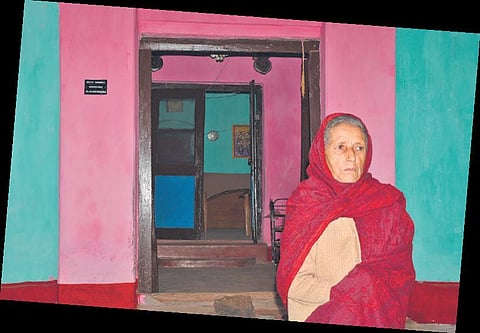

MCCLUSKIEGANJ: “You must meet Kitty Ma’am, she will tell you about the Anglo-Indians here,” more than one local said in this quaint town with an even stranger name, McCluskieganj. As the shadows lengthened and smoke from the winter wood fire rose in the horizon, Kitty Teixeira (69), Kitty Ma’am to the locals, munched on rice and dal in the two-room tenement she shares with her daughter and grandchildren.
Wrapped in a red shawl, she is frail, wrinkled, graying and hardly audible because of her advanced age. But asked about the scrapping of the nominated seats in the Lok Sabha and 14 State Assemblies for Anglo-Indians, her community, she suddenly became vocal.
“This is shocking for the community as we must have representation in the Assembly and the Lok Sabha to make our voice heard,” she said. “The rights of every Anglo-Indian must be restored.”
Located about 70 kms from Ranchi, McCluskieganj is not a place one would expect to find Anglo-Indians. A small railway station, only one big school and not a single good hospital, Maoists once to rule the roost here. But given the sylvan surroundings, hilly terrain and salubrious climate, it is not hard to realise why Anglo-Indians made this their home.
McCluskieganj, also known as ‘Mini-England,’ was founded by a property dealer from Kolkata, Ernest Timothy McCluskie, an Anglo-Indian born to an Irish father and an Indian mother. He came up with the idea of a “homeland” and managed to convince Ratu Maharaja of Chota Nagpur to give land for Anglo-Indians.
In 1933, the ‘Colonization Society of India’ was formed and an agreement was signed between the two. McCluskie bought 10,000 acres of land in the forested hills of Lapra and named it McCluskieganj. He later invited Anglo-Indians to live here. Recalling the years gone by, Kitty said the place used to have everything right, from colonial style bungalows and a bakery to club houses and churches. It is said McCluskieganj was once home to about 350-400 Anglo-Indian families where Christmas was celebrated with a ball, wine, jalfrezi and cinnamon cakes.
“Now only 10-12 families are left,” Kitty said. Doubting the government figure of only 296 Anglo-Indians all over India, she said the actual number would be several times more.
Future tense: Anglo-Indian hub relives glorious past
Harold Mendis, 74, who runs a school, strongly opposed government’s decision to end the quota for the Anglo-Indians. “Neil O’Brian, the president of the Anglo-Indian Society, will conduct a census and hand over the actual list of Anglo-Indians to the government. We request it to review its decision,”
Mendis said.
He said those who had migrated to other places or countries were dying to return as anyone who lives here for some time falls in love with the place. “Some people migrated to other places looking for better opportunities, but they still miss the natural beauty of McCluskieganj and call us frequently to say they want to come back,” Mendis claimed.
Debra Barret, a third-generation Anglo-Indian living in McCluskieganj, said the second generation of the community had to face difficulties owing to lack of employment, forcing them to leave for other places.
It was after 1997, when Alfred de Rozario, another Anglo-Indian, opened a branch of the Don Bosco Academy here, it opened up opportunities for everyone living in the region. “Most of the Anglo-Indians are now in school, coaching and hostel business as the place has developed as an education hub for adjoining districts and people send their children here for better education,” Barret said about the community.
Referring to the recent decision to end the nominated members in elected houses, she said the government must review the decision after ascertaining their population.
“There are several families living in Jamshedpur, Chakradharpur, Asansol, Kolkata, Mumbai and other places. The government should get into the facts first and review its decision. There must be someone of our own to hear our voices and convey it to the government,” Barret said.